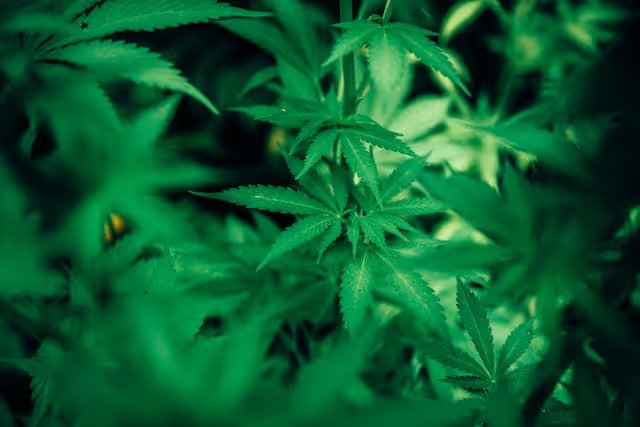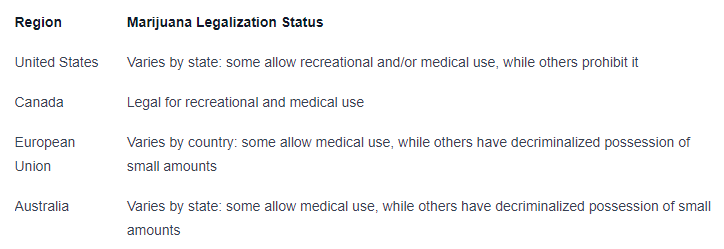Is Marijuana Bad for You?

Understanding Marijuana
To have a balanced perspective on the topic of marijuana, it's important to first gain a basic understanding of what marijuana is and the different forms it can take.
Introduction to Marijuana
Marijuana, also known as cannabis, is a psychoactive drug derived from the Cannabis plant. It contains various chemical compounds, known as cannabinoids, that interact with receptors in the brain and body, producing different effects. The primary psychoactive compound in marijuana is delta-9-tetrahydrocannabinol (THC), which is responsible for the "high" that users experience.
Marijuana has been used for both medicinal and recreational purposes for centuries. It has gained significant attention in recent years due to ongoing debates surrounding its legality, potential health benefits, and potential risks.
Different Forms of Marijuana
Marijuana can be consumed in various forms, each with its own method of use and onset of effects. The most common forms of marijuana include:
- Dried Flowers/Buds: The most recognizable form of marijuana, dried flowers or buds are typically smoked in a joint or pipe. They can also be used to make edibles or infused into oils for cooking.
- Concentrates: Concentrates are highly potent forms of marijuana that contain high levels of THC. These can come in the form of oils, waxes, shatter, or hash. Concentrates are usually vaporized or dabbed using specialized equipment.
- Edibles: Edibles are food products infused with marijuana extracts or oils. They come in a wide range of forms, such as cookies, brownies, gummies, or beverages. Edibles take longer to take effect compared to smoking or vaporizing, as they need to be digested first.
- Topicals: Marijuana-infused topicals include creams, lotions, or balms that are applied directly to the skin. These products are typically used for localized relief, such as reducing pain or inflammation.
- Tinctures: Tinctures are liquid extracts of marijuana that are usually taken sublingually (under the tongue). They are absorbed into the bloodstream quickly, providing fast-acting effects.
Understanding the different forms of marijuana is crucial when discussing its potential risks and benefits. It's important to note that the effects of marijuana can vary depending on the form, dosage, and individual factors.
Debunking Misconceptions
Dispelling misconceptions about marijuana is essential for understanding its true risks and benefits. Let's address and debunk three common myths surrounding marijuana.
Myth: Marijuana is Highly Addictive
Contrary to popular belief, marijuana is not highly addictive. While it is possible to develop a psychological dependence on marijuana, the risk of addiction is relatively low compared to substances like nicotine or opioids.
According to the National Institute on Drug Abuse (NIDA), around 9% of marijuana users develop an addiction. This percentage increases to about 17% for those who start using marijuana during adolescence. However, it's important to note that addiction rates may vary depending on individual factors and patterns of use.
Myth: Marijuana is a Gateway Drug
Another common misconception is that marijuana is a gateway drug, meaning its use will inevitably lead to the use of more dangerous substances. However, there is no evidence to support this claim.
Research conducted by the National Academy of Sciences found that the majority of marijuana users do not go on to use harder drugs. The idea of marijuana acting as a gateway drug is based on correlation rather than causation. Other factors, such as personal circumstances and individual predispositions, play a more significant role in substance use progression.
Myth: Marijuana Causes Permanent Brain Damage
There is a widely held belief that marijuana causes permanent brain damage, particularly in relation to cognitive functions. However, scientific studies have shown that the long-term effects of marijuana use on the brain are not as severe as once thought.
While marijuana use can temporarily impair memory and cognitive performance, these effects are typically reversible and diminish after a period of abstinence. It's worth noting that heavy and prolonged marijuana use during adolescence may have a more significant impact on brain development due to the ongoing maturation of the brain during this period.
By dispelling these misconceptions, we can have a more informed discussion about the real risks and potential benefits of marijuana use. It's important to approach the topic with accurate information and consider individual factors when assessing the impact of marijuana on an individual's well-being.
Evaluating the Real Risks
Dispelling misconceptions about marijuana involves understanding the potential risks associated with its use. In this section, we will explore the potential health risks of marijuana use, the impact of marijuana on mental health, and the long-term effects that may arise from its consumption.
Potential Health Risks of Marijuana Use
While marijuana is widely regarded as a relatively safe substance, it is not without potential health risks. It's important to be aware of these risks in order to make informed decisions about marijuana use. Here are some potential health risks associated with marijuana:
Potential Health Risks
Respiratory issues (such as chronic bronchitis) due to smoking marijuana
Increased heart rate and potential cardiovascular effects
Impaired coordination and increased risk of accidents
Negative effects on memory and cognitive function, particularly in heavy users
It's worth noting that the severity and likelihood of these risks can vary depending on factors such as the frequency and duration of use, the method of consumption, and individual susceptibility.
The Impact of Marijuana on Mental Health
Marijuana use can also have an impact on mental health. While it does not cause mental illnesses, it may interact with pre-existing conditions or contribute to certain mental health symptoms. Here are some key considerations:
Impact on Mental Health
Increased risk of experiencing anxiety or panic attacks, particularly in high doses or for individuals prone to anxiety
Potential exacerbation of symptoms in individuals with psychotic disorders, such as schizophrenia
Potential impact on motivation, particularly in heavy and long-term users
It's important to note that the relationship between marijuana and mental health is complex, and more research is needed to fully understand the extent of these effects.
Long-Term Effects of Marijuana Use
Long-term marijuana use may have certain effects on both physical and mental well-being. While some of these effects are still being studied, here are some commonly discussed long-term effects of marijuana use:
Long-Term Effects
Potential dependence or addiction, especially in heavy and prolonged users
Reduced lung function and respiratory issues, particularly in individuals who smoke marijuana
Impaired educational and occupational achievement, particularly if marijuana use starts at a young age
Relationship strain and social consequences, particularly if marijuana use becomes problematic
It's important to emphasize that not all individuals who use marijuana will experience these long-term effects. The risks can vary depending on various factors, including patterns of use, potency of the product, and individual susceptibility.
Understanding the potential health risks, the impact on mental health, and the long-term effects of marijuana use is crucial for making informed decisions. It's essential to weigh the potential risks against the potential benefits and consider individual circumstances when evaluating the overall impact of marijuana use on one's well-being. If any concerns arise, consulting with a healthcare professional can provide further guidance and support.
Responsible Marijuana Use
When it comes to marijuana consumption, responsible use is important to ensure both personal well-being and compliance with the law. This section will discuss legal considerations, harm reduction strategies, and seeking professional help when needed.
Legal Considerations
It's crucial to be aware of the legal status of marijuana in your jurisdiction. Laws regarding marijuana use vary from country to country and even within different states or regions. Familiarize yourself with the specific regulations in your area to avoid any legal consequences.
Here is a general overview of the legal status of marijuana in different parts of the world:

Always stay informed about any changes in legislation and adhere to the laws of your jurisdiction to avoid legal complications.
Harm Reduction Strategies
For those who choose to use marijuana, there are harm reduction strategies that can help minimize potential risks. These strategies include:
- Start with low doses: Begin with a small amount and gradually increase if necessary. This allows you to gauge your tolerance and minimize the risk of adverse effects.
- Avoid mixing substances: Combining marijuana with alcohol or other drugs can increase the potential risks and side effects. It's best to use marijuana on its own.
- Be mindful of the method of consumption: Different methods of marijuana consumption have varying effects on the body. For example, smoking marijuana can irritate the respiratory system, while edibles can have a delayed onset of effects. Choose a method that aligns with your preferences and consider the potential risks.
- Use in a safe and comfortable environment: Ensure that you are in a familiar and safe environment when using marijuana. This can help reduce the chances of accidents or negative experiences.
Seeking Professional Help if Needed
If you have concerns about your marijuana use or if you experience negative effects, it's important to seek professional help. Healthcare professionals, such as doctors, therapists, or addiction specialists, can provide guidance, support, and resources to address any issues related to marijuana use.
Remember, open and honest communication with healthcare professionals is key to receiving the appropriate assistance and guidance tailored to your individual needs.
By considering legal implications, adopting harm reduction strategies, and seeking professional help when necessary, individuals can engage in responsible marijuana use. It's essential to prioritize personal safety, well-being, and compliance with the law to ensure a positive and informed approach to marijuana consumption.
Conclusion
Marijuana is a complex and multifaceted topic that requires careful consideration of its various aspects. While there are still ongoing debates about its legality and potential risks, it's important to approach the topic with an open mind and accurate information.
By debunking common misconceptions, evaluating the real risks associated with marijuana use, and understanding responsible consumption practices, individuals can make informed decisions about their use of this substance. It's crucial to prioritize personal safety, well-being, and compliance with the law when engaging in marijuana consumption.
As research continues to shed light on the potential benefits and risks of marijuana use, it's essential to remain aware of any new developments and adjust our knowledge accordingly. Ultimately, by approaching the topic with accurate information and an open-minded perspective, we can have a more informed discussion about marijuana use and its impact on our lives.
